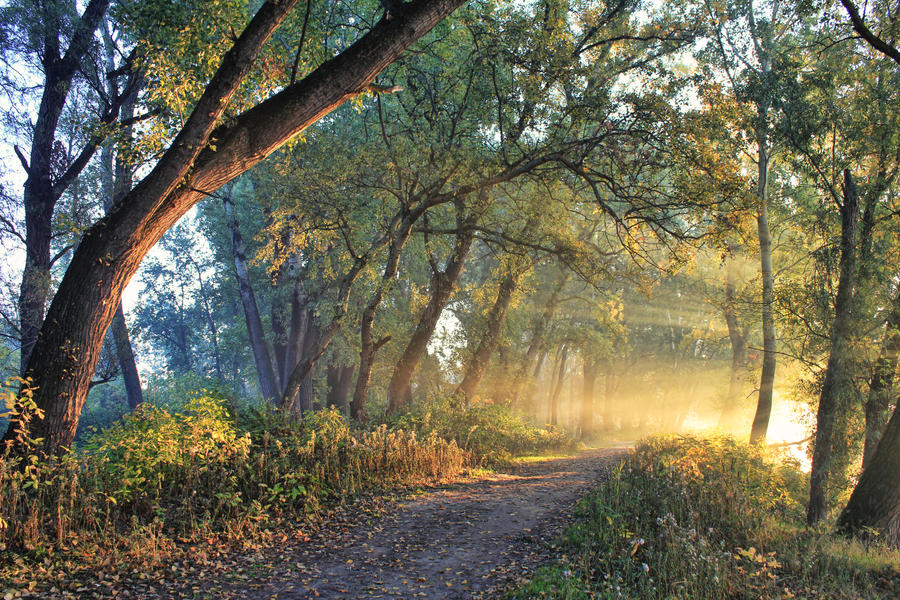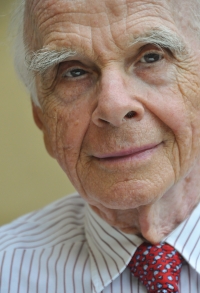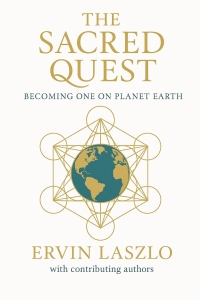The Royal Road
The great quest is already starting: finding the good way, the “royal road,” toward a better world. Recreating the old world is not an option—it is literally a dead-end. Then what is the right way: what road can take us from here to there—from a crisis-ridden uncertain and chaotic world to a world that offers a better, higher quality of life to the presently suffering and disoriented people of the human family?

It should be clear to us that the royal road exists. The problems of the world are our creation, and we need to cope with them. But we should also be clear that entering on that road calls for major changes in the way we think and act—it calls for a new and different mindset. This article does not offer a detailed roadmap to a better world, but suggests the mindset we need to find our way to it. Given the that the old mindset was behind the crises, uncertainties and unsustainabilities we are experiencing, changing it for a better mindset mindset—a newparadigm—is the key. We need a new way of thinking and acting. Here we describe the new paradigm’s essential hallmarks in the simplest possible terms.
Wholeness
The new paradigm suggests a fundamental change in the way we understand the world. The way we understood the world is obsolete and downright dangerous: it has placed us on a road beset by inequity due to the power-play of unequal competitors in no-holds-barred arenas. It was a case of compete to survive—the winner takes all and the devil takes the rest. But this is not the real world—not the world we are beginning to glimpse through the findings of the cutting-edge physical and biological sciences. According to the emerging indisghts we are not separate cogs in an enormous soulless machine. We are part of what there is, and what there is, is a quasi-livingsystem—a coherent, seamless whole. We are organic parts in a dynamic whole-system—the web of life on the planet. Today this assertion is not speculation: it is science. Our separateness, Einstein said, is an illusion.
Humanity lived with the illusion of separateness for centuries. Our fathers and their fathers created the world of the 20th century in this mistaken light. In that view you and I are separate beings, with separate interests. Our interests may coincide, but there is no assurance that they do. In everyday practice, they often conflict. We need to defend our interests in face of everybody else.
Now the quantum sciences tell us that we are not separate beings but are intrinsically and intrinsically interconnected. Our interests do not need to conflict. Intrinsic interconnection means that we are part of a larger whole, and what is good for that whole, is good for you and for me—and for all of the whole’s parts. The bottom line is that which is good for me is good for you—and what is good for you ios good for me. And that which is bad for you and for me is bad for all the others. We should learn to play “positive sum games” where all parties win. They can win, if the whole of which they are a part wins.
Oneness
A better world can only be built on the basis of intrinsic, mutually constitutive interconnections. Setting out on the royal road calls for using these interconnections. They transcend the bounds of who we thought we are. When two people—let us call them A and B—are intrinsically interconnected, they are one and not two. This is important, because it has a critical entailment: if I am one with you, I intend you well the same as I intend well for myself. If I love myself, I also love you—in principle, and in the optimum case, also in practice.
Evidently, what is meant here by you and me is not limited to individuals. From the viewpoint of A, B is the whole of the human family. There are no “strangers” in this family—we are all family members. We rightfully see ourselves as one. And we rightfully and effectively act as one.
Expanding our identity to encompass “you”—meaning all members of the human family—is a large order, but it is still not all that’s needed for traveling the royal road. Even when we identify ourselves with all people in the human family, we can still see ourselves and the rest of this family as separate from the nonhuman members of the larger community of life. If we consider ourselves separate from any form of life, the ills and problems of the modern world rise up again: our individual and collective alienation from nature, and our irresponsible exploitation of the environment.
Being one with our fellow members of the human community is one giant step toward the royal road, yet another step must follow. That step is to be one with “Life” —with a capital “L.” Capital “L” Life is the ensemble of all the living beings that populate the planet. Oneness with people and oneness with nature are both necessary—and they do not conflict. Life—the ensemble of all forms of life on the planet—is the embracing system in which we live our life. In which we persist and can thrive.
We can experience our oneness with Life: this experience has been reported by mystics and spiritual people throughout history. The contemporary mystic Rasha, who transcribed her own experience of encompassing oneness in a book aptly titled “Oneness,” described this experience in the following words:
The reality toward which you flow—effortlessly, if you allow it—is unbound by the linear concept of time and space. It is reality where physical perception, by the definition, is superfluous. It is the result of a melding, a bonding, a joyful unity of the totality of your essence in harmony with what is now perceived to be “others.”Ultimately, there will be no distinction between the perception of “self” and “others.” For all will be Oneness. We are that Oneness. We are the unity of All That Is. (Earthstar Press, Santa Fe, NM, 2003)
Love
Taking the royal road to a better world calls for feeling oneness with all living beings on Earth. This feeling is the fountainhead of the experience of love: of unconditional universal love.
When Albert Schweitzer issued his famous call for “reverence for life,” he had in mind the recognition of our oneness with all living things: with Life. When we feel reverence for Life, we feel oneness for beings who stem from a different living species, but are not external to us, they are not “other” than we are. The medieval Persian mystic Rumi said that we are not a drop in the ocean; we are the ocean in a drop. We are not only in the living world—the living world is in us.
Such insights and assertions have been dubbed spiritual metaphysics in the past, but leading thinkers and scientists now recognize them as stemming from sound science. They are grouinded in the new physics and the new cosmology. The the universe is a whole system: it is like a hologram, or perhaps it is itself a hologram. In the holographic universe all the things that “are,” are there in every part. The universe is in every atom. And if so, the universe is in you and me. Non-separateness is the basic hallmark of the emerging concept of reality.
Evolution
Until but a few decades ago, the majority of life scientists maintained that life on Earth is a product of a stupendous serendipity—life is a cosmic accident. Random interactions beginning in the aftermath of the Big Bang 13.8 billion years ago produced the universe we inhabit, and produced the living beings who now inhabit the universe. Now we know better. Life is not a product of random interactions; it is not an accident. It is the expression of a universal drive that comes to expression whenever and wherever it can find expression. Scientific evidence for this ancient spiritual tenet is now forthcoming. Organic molecules, the seeds of biological life, are found even in the vicinity of active stars, where physicists thought nothing so complex as an organic structure could emerge and persist. But life is likely to have developed in many places in the inverse, first and foremost on planets orbiting active stars. On Earth, it has first appeared nearly four billion years ago, and it continues to appear wherever physical-chemical conditions permit.
The fact is that the emergence of life is an expression of a fundamental drive that we recognize as the universal drive of evolution. The evolution of living organisms on this planet is not due, as we had thought, to entities created by random interactions seeking fitness to their environment. If this were the case, our planet would be populated by blue-green algae, amoebae, and other unicellular, colonial, and simple multi-cellular organisms. These species have achieved a nearly perfect adaptation to their environment; in Darwinian terms, they are amazingly “fit.” Nothing short of volcanic eruptions, sudden climatic change and natural catastrophe could precipitate their extinction.
Yet the biosphere is not primarily populated by super-fit organisms: species have evolved beyond the range of their optimum adaptation to the environment. Living species explore all the niches that are available to them, even those that offer the barest minimum of the resources required for life. So-called extremophiles tolerate extremely high (and others extremely low) temperatures, pressures, radiations, and levels of acidity or alkalinity. They invade and colonize niches near active volcanos, deserts, and the deep sea. They persist in conditions that were thought to be lethal to organic life.
Alignment with evolution has notable consequences for living systems. When they are in tune with the drive for evolution, they are well; they flourish. Evolutionary alignment fosters being and produces wellbeing. This applies to the trees and the bees as well as to our fellow human beings.
The evidence is clear: the evolution of life is not merely toward adaptation to given conditions. Evolution is a drive toward the creation of complex and coherent thermodynamically open systems: self-maintaining, self-regenerating wholes, integral ensembles of their parts.
Seeking the royal road to a better world is a realistic endeavor. Many young people are already finding the way, following their emerging insights and expressing them in music and in prose, honing a new feel for the future and a new paradigm for living and loving. The new story, with its intuitive feel and spontaneous insight, is spreading, and with good reason: it is is aligned with “the force”: the cosmic drive for evolution.
Now go with the force
“To go with the force” means to be aligned with nature’s drive toward coherent wholeness. Now that the human community iis waking up, the opportunity to create this alignment is at hand. More and more people are seizing it, and we can expect rapid and radical developments. More and more individuals will revere Life and feel oneness with a world that is not outside, but also in them. This development will encompass ever wider groups and communities of open and sensitive people. It will become a force in politics, in the economy, in technological development, and in environmental protection and care.
Before long, “the force,” which is the drive for evolution throughout nature, will inform the body and illuminate the mind of a critical mass of people. Together they will set about to build a better world. This is the royal road ahead. Humanity can, and I believe will, enter on it.
Written by Ervin Laszlo
2021 March

%203D.png)
